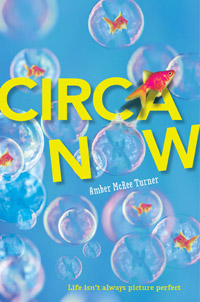Remastering Memory
Can the protagonist of Amber McRee Turner’s new middle-grade novel, Circa Now, alter the past with a computer program?
Eleven-year-old Circa Monroe adores her father, who digitally restores old and damaged photographs. The two share a love of turning cliché photos into eccentric “Shopt” images by inserting an undulating octopus tentacle behind smiling newlyweds, for example, or creating nonsense words that swirl out of the smoke of birthday candles a little boy is blowing out. Circa’s father makes up fantastical stories about these Shopt photos, and the charming images and the stories are included between chapters of Amber McRee Turner’s new middle-grade novel, Circa Now.
Circa’s mother is a portrait photographer with a studio in their home. She suffers from depression, which she describes as being like “carrying a wet bag of sand everywhere you go. Heavy and messy and hard to shake.” Circa’s understanding father quietly keeps things running at home, checking up on Circa’s schoolwork, making their meals, encouraging her mother, donating time to a project to restore photographs for a “Memory Wall” at a local nursing home that cares for patients with Alzheimer’s.
 The family’s center falls apart when Circa’s father is killed in a tornado while delivering photographs to a family reunion. Circa finds herself taking on her father’s role, gently encouraging her mother to start their lives over again, creating her own Shopt images and stories, and trying to carry on her father’s work at the nursing home. But her digital skills aren’t up to her father’s, and it looks as though the patients at the home will be disappointed when plans for the Memory Wall are abandoned in place of a generic wall fountain.
The family’s center falls apart when Circa’s father is killed in a tornado while delivering photographs to a family reunion. Circa finds herself taking on her father’s role, gently encouraging her mother to start their lives over again, creating her own Shopt images and stories, and trying to carry on her father’s work at the nursing home. But her digital skills aren’t up to her father’s, and it looks as though the patients at the home will be disappointed when plans for the Memory Wall are abandoned in place of a generic wall fountain.
Slowly Circa begins to notice that the images she inserts into photographs seem to be becoming real. She takes a picture of a tree, inserts a bird’s nest into it, and the next day a nest appears there. Her best friend, Nattie, longs for a dog, so Circa adds a dog to a picture of Nattie’s backyard. When Nattie complains about stepping in dog poo in her own yard, Circa is convinced that she is capable of altering the real world with her computer and a bank of images.
Then a mysterious boy who calls himself Miles shows up at their house. He appears to be about twelve years old but says that he has no memory of anything before he found himself at the family reunion where Circa’s father was killed. What’s the boy’s connection with Circa’s father and his death? And most importantly, if Circa can alter the present by changing a photograph, what will happen if she deletes the image of the tree that her father crashed into on that awful night? Will she reverse fate, preventing his death?
 The action is slow to start, and some of the plot details are a bit contrived—it’s difficult to believe, for example, that a lost teenager with amnesia would be allowed to stay with a family he’s not related to and that’s headed by a depressed single parent –but younger readers are not likely to be concerned with these points. The supporting cast is well drawn and believable, especially Nattie and the unpleasant teenage custodian at the nursing home, Stanley. Turner’s turns of phrase are delightful, adding to the quirky tone of the book without drawing attention away from the story. Circa’s mother’s depression is sensitively drawn, without condemnation but with a recognition of the difficulty illness causes a family, especially when a child, though nobody’s fault, is called upon to shoulder adult responsibilities.
The action is slow to start, and some of the plot details are a bit contrived—it’s difficult to believe, for example, that a lost teenager with amnesia would be allowed to stay with a family he’s not related to and that’s headed by a depressed single parent –but younger readers are not likely to be concerned with these points. The supporting cast is well drawn and believable, especially Nattie and the unpleasant teenage custodian at the nursing home, Stanley. Turner’s turns of phrase are delightful, adding to the quirky tone of the book without drawing attention away from the story. Circa’s mother’s depression is sensitively drawn, without condemnation but with a recognition of the difficulty illness causes a family, especially when a child, though nobody’s fault, is called upon to shoulder adult responsibilities.
Turner, a Memphis native, gives just enough detail about the technique of altering photographs to intrigue readers, who may be inspired to try their own hands at digital play of this sort. The author’s website includes the book’s delightful “Shopt” photographs to be used as story starters.
As she did in her first novel, Sway, Turner has set herself a difficult task in Circa Now. A tale about loss and death and mental illness could easily become dreary. Some authors would overcorrect, making the book chirpily optimistic, but Turner hits a happy medium, creating a believable character who tries her best to pick up the pieces of her damaged life but occasionally fails, falling short in her relationship with her best friend, losing her temper, but always trying to do the right thing, even if, as her father told her, “sometimes doing the right thing is prickly.”

Tracy Barrett is a writer who lives in Nashville. Her twentieth book for young readers, a Cinderella retelling entitled The Stepsister’s Tale, will be published in June by Harlequin TEEN.


